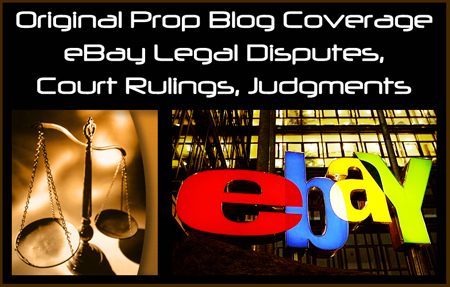As part of an ongoing series of legal disputes that have challenged the manner in which eBay operates its auction business and website, today the European Union Court of Justice provided clarification on questions pertaining to a case before the High Court in the United Kingdom over a dispute brought by L’Oréal against the global auction giant. The Court of Justice ruled that eBay may be liable for the sale of counterfeit and trademark-infringing goods, based on the circumstances and what kind of “active role” it plays in the sale of the goods.
The court also ruled that eBay may have to more actively monitor the sale of its goods to ensure that the items are lawful. The case is a result of complaints made by cosmetics giant, L’Oreal, who has claimed that eBay facilitates the sale of counterfeit goods on their auction website, as well as allows the sale of samples and testers marked “not for sale”. The Court found that eBay could be held liable if they had sufficient information to determine that goods were not lawful and failed to prevent the sale of such material.
While much of these legal disputes in recent years relate to manufacturers of luxury goods (LVMH, Tiffany & Company) and the sale of fraudulent and counterfeit, trademark-infringing goods, it is of direct interest to the original film and television prop and costume collecting community in that eBay facilitates the sale of fraudulent material to the public marketplace via its auction website and its “Original” categories for movie and television props and costumes.
The official press release from the Court of Justice of the European Union can be found below (Click for PDF | Click for Full Ruling):
The Court provides clarification on the liability of companies operating internet marketplaces for trade mark infringements committed by users
National courts must be able to order those companies to take measures intended not only to bring to an end infringements of intellectual property rights but also to prevent further infringements of that kind
eBay operates a global electronic marketplace on the internet, where individuals and businesses can buy and sell a broad variety of goods and services.
L’Oréal is the owner of a wide range of well-known trade marks. Its products (especially cosmetics and perfumes) are distributed through a closed distribution network, in which authorised distributors are restrained from supplying products to other distributors.
L’Oréal complains that eBay is involved in trade mark infringements committed by users of its website. Moreover, it claims that, by purchasing from paid internet referencing services (such as Google’s AdWords) keywords corresponding to the names of L’Oréal trade marks, eBay directs its users towards goods that infringe trade mark law, which are offered for sale on its website. Furthermore, L’Oréal is of the view that eBay’s efforts to prevent the sale of counterfeit goods on its website are inadequate. L’Oréal has identified various forms of infringement, including, inter alia, the sale and offer for sale, to consumers in the EU, of goods bearing L’Oréal’s trade marks intended, by L’Oréal, for sale in third States (parallel importation).
The High Court (United Kingdom), before which the dispute is pending, has asked the Court of Justice a number of questions concerning the obligations to which a company operating an internet marketplace may be subject in order to prevent trade mark infringements by its users.
The Court states, as a preliminary point, that the proprietor of the trade mark may rely on his exclusive right as against an individual who sells trade-marked goods online only when those sales take place in the context of a commercial activity. That is the case, in particular, if the sales, owing to their volume and frequency, go beyond the realms of a private activity.
The Court rules first of all on commercial activities directed towards the EU by means of online marketplaces such as eBay. It states that the EU trade mark rules apply to offers for sale and advertisements relating to trade-marked goods located in third States as soon as it is clear that those offers for sale and advertisements are targeted at consumers in the EU.
It is for the national courts to assess, on a case-by-case basis, whether there are any relevant factors on the basis of which it may be concluded that an offer for sale or an advertisement, displayed on an online marketplace, is targeted at EU consumers. For example, the national courts will be able to take into account the geographic areas to which the seller is willing to dispatch the product.
Next, the Court holds that the operator of an internet marketplace does not itself ‘use’ trade marks within the meaning of the EU legislation if it provides a service consisting merely in enabling its customers to display on its website, in the course of their commercial activities, signs corresponding to trade marks.
The Court also specifically mentions certain matters concerning the liability of the operator of an online marketplace. Whilst making clear that it is for the national courts to carry out the assessment concerned, the Court considers that the operator plays an active role of such a kind as to give it knowledge of, or control over, the data relating to the offers for sale, when it provides assistance which entails, in particular, optimising the presentation of the online offers for sale or promoting those offers.
When the operator has played an ‘active role’ of that kind, it cannot rely on the exemption from liability which EU law confers, under certain conditions, on online service providers such as operators of internet marketplaces.
Moreover, even in cases in which the operator has not played an active role of that kind, it cannot rely on that exemption from liability if it was aware of facts or circumstances on the basis of which a diligent economic operator should have realised that the online offers for sale were unlawful and, in the event of it being so aware, failed to act promptly to remove the data concerned from its website or to disable access to them.
Finally, the Court rules on the question of injunctions which may be granted against the operator of an online marketplace when it does not decide, on its own initiative, to bring to an end infringements of intellectual property rights and to prevent further such infringements occurring.
Thus, the operator may be ordered to take measures making it easier to identify the sellers who are its customers. In that regard, although it is necessary to respect the protection of personal data, the fact remains that when the perpetrator of the infringement is operating in the course of trade, and not in a private matter, that person must be clearly identifiable.
Consequently, the Court holds that EU law requires the Member States to ensure that the national courts with jurisdiction in relation to the protection of intellectual property rights are able to order the operator to take measures which contribute, not only to bringing to an end infringements of those rights by the users, but also to preventing further infringements of that kind. Those injunctions must be effective, proportionate, and dissuasive and must not create barriers to legitimate trade.
Past articles published by the Original Prop Blog related to other legal disputes and court proceedings can be found via the portal below:
Jason DeBord


